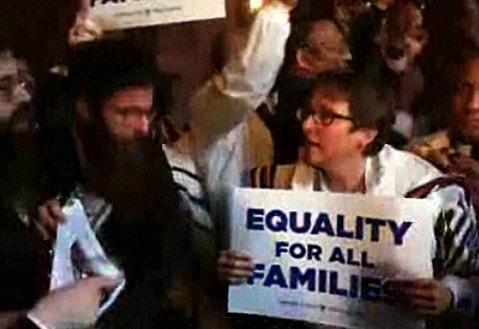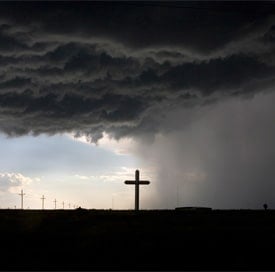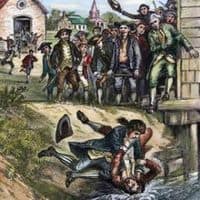
(image from ny marriage equality battle in albany, 2011)
Whenever same-sex marriage finds a new home, whether in Massachusetts in 2004, Iowa in 2009 or in New York in 2011, the media feature a few stories about private individuals or private businesses who seek to deny service to gays and gay couples because homosexuality or same-sex marriage does not comport with their interpretations of their religious teachings. Some of these stories border on the hilarious — there is no way I'm going to hire, say, "Christian Brothers DJay" to entertain my guests in accordance with Jesus's teachings – while others are more tragic or serious — when a hospital denies service, for example.
 The issue of religious exemptions to same-sex marriage rights was a prominent part of the recent marriage debate in the New York State Senate, where certain Republican votes hinged on exemptions for religious institutions and where some wanted explicit protections for private individuals. Thankfully, the latter never made it into the final bill.
The issue of religious exemptions to same-sex marriage rights was a prominent part of the recent marriage debate in the New York State Senate, where certain Republican votes hinged on exemptions for religious institutions and where some wanted explicit protections for private individuals. Thankfully, the latter never made it into the final bill.
These would-be discriminators like to situate themselves in a long line of religious martyrs and freedom fighters, who stand up for their beliefs in the face of what they see as "political correctness" or a society "sliding toward Gomorrah." It is their little act of rebellion in a history of American rebelliousness against governments whose policies ostensibly show them out of touch with the populace. It is, they think, their prerogative to exercise their right to worship as they please and live the life they please, in accordance with their deeply held religious teachings. Both of those traditions — rebellion and religious liberty — are part of the ethos of American history, particularly of the late 18th and through the middle of the 19th centuries.
But, if this is who we are – if we are an individualistic culture, founded by pious Calvinists searching for space to worship without interference and encouraged to make our voices heard at the ballot and in the streets when our government goes astray — how can I deny private individuals the right to discriminate against gays using their personal interpretations of the Bible as a shield? In short, what we once were is not who we are today.
CONTINUED, AFTER THE JUMP…
This country has a strong religious tradition. New England was founded by religious zealots who left England because the Court of St. James was not pious enough. The First Great Awakening of the mid 18th Century witnessed these conservative denominations doubling down on their expressions of belief, with Jonathan Edwards's "Sinners in the Hands of an Angry God" sermon of 1741 as the paradigmatic example of this religious rebirth. By the early 19th Century, the Second Great Awakening created new Christian denominations and gave the Abolitionist Movement moral heft.
Some historians describe this period of American religious history as the "individualization of religion." What they mean is that while Protestants always distinguished themselves from Catholics by their focus on the believer — to Calvinists, for example, salvation could found inside, not by priestly absolution — the American religious "awakenings" further decentralized religious observance to the individual. Congregation members were encouraged to pray on their own, to live the religious life in every personal decision they make and to see religious belief as the guiding force behind their daily lives. The pastor focused on individual sin, not the role of religion in society at large; the congregation was a gathering of individual sinners, not a community of man searching for salvation.
 At the same time, American democracy began a long transition from elites who focused on the common good — think Alexander Hamilton and James Madison, who used The Federalist Papers to argue for a strong central government that would temper the widely fluctuating and wild will of the people — to a "small-d" democratic culture that prized individualism. This was an American society characterized by Shays' Rebellion and the Whiskey Rebellion and then later by Jacksonian Democracy and, ultimately, the principle that secession was somehow a very American thing to do. Shays' Rebellion was a tax revolt that pitted rugged individualists on the frontier against wealthier businessmen whose livelihood looked eastward across the Atlantic. Not surprisingly, the Whiskey Rebellion was also a tax revolt of westerners against easterners: in 1791, Congress levied a tax on whiskey, which was made and distilled in western parts of Pennsylvania and other states, so the new government back east could raise needed revenue. And, by the 1820s, when the supposed "man on the people" Andrew Jackson brought a little bit of Main Street into the hallowed, stifling halls of Washington, D.C., the language of Jackson's democrats was steeped in the little guy-versus-the big bad central government.
At the same time, American democracy began a long transition from elites who focused on the common good — think Alexander Hamilton and James Madison, who used The Federalist Papers to argue for a strong central government that would temper the widely fluctuating and wild will of the people — to a "small-d" democratic culture that prized individualism. This was an American society characterized by Shays' Rebellion and the Whiskey Rebellion and then later by Jacksonian Democracy and, ultimately, the principle that secession was somehow a very American thing to do. Shays' Rebellion was a tax revolt that pitted rugged individualists on the frontier against wealthier businessmen whose livelihood looked eastward across the Atlantic. Not surprisingly, the Whiskey Rebellion was also a tax revolt of westerners against easterners: in 1791, Congress levied a tax on whiskey, which was made and distilled in western parts of Pennsylvania and other states, so the new government back east could raise needed revenue. And, by the 1820s, when the supposed "man on the people" Andrew Jackson brought a little bit of Main Street into the hallowed, stifling halls of Washington, D.C., the language of Jackson's democrats was steeped in the little guy-versus-the big bad central government.
If anything, our society has become more religious and more individualistic. After the middle of the 20th Century, federal law took a decidedly individual rights focus, incorporating the Bill of Rights to the states and ushering in the greatest rights-based revolution in history. At the same time, evangelical religious movements grew in popularity, with religious conservatives flexing their muscles in the political and social arena since the 1970s.
This reflects a society that is part Horatio Alger and part Jonathan Edwards, part pick-yourself-up-by-your-bootstraps and part original sinner. It makes sense that respect for religious freedom would have a strong presence in this society.
But, that duality no longer describes who we are.
As a society, we have made the collective decision that private religious observance does not trump group civil rights. This decision is manifested in what are called "public accommodation laws." Public accommodation laws prohibit, in the paradigmatic example of New Jersey, "an owner, manager, or employee of any place that offers goods, services and facilities to the general public, such as a restaurant, hotel, doctor's office, camp, or theater, from directly or indirectly denying or withholding any accommodation, service, benefit, or privilege to an individual because of that individual's race, creed, color, national origin, nationality, ancestry, marital status, domestic partnership or civil union status, sex, affectional or sexual orientation, gender identity or expression, or disability." Of course, those terms differ from state to state; in a state without civil unions, there can be no anti-discrimination law based on civil union status, for example. There are lots of public accommodations laws: the Civil Rights Act and the Americans with Disabilities Act are just two of the most famous statutes with non-discrimination in public accomodations provisions.
Regardless of those differences, public accommodation laws exist in every state and even if they have not yet been amended to include discrimination on the basis of sexual orientation, they should, not simply because it is the right thing to do, but because it reflects the choice we have made in society that respect for community identity trumps the religious exercise of those who avail themselves of commerce and state or federal law. It is a classic conflict between two so-called rights — one whose answer is implicit in the very existence of public accommodations laws — that cannot be answered simply by recourse to the view that we as a society should treat everyone equally.
If equality were all that mattered, there would be no way to value one person's right over another; the right to religious freedom is a right just like the right to marry. Nor is this simply a matter of non-discrimination: public accommodations laws discriminate against those who would discriminate. Rather, we have made a value judgment that certain exercise of individual rights conflict with fostering minority identity in a pluralistic society. It is for that reason that religious exemptions for private individuals who wish to discriminate against gay couples are simply un-American.
***
Ari Ezra Waldman is a 2002 graduate of Harvard College and a 2005 graduate of Harvard Law School. After practicing in New York for five years and clerking at a federal appellate court in Washington, D.C., Ari is now on the faculty at California Western School of Law in San Diego, California. His research focuses on gay rights and the First Amendment. Ari will be writing weekly posts on law and various LGBT issues.
Follow Ari on Twitter at @ariezrawaldman.



